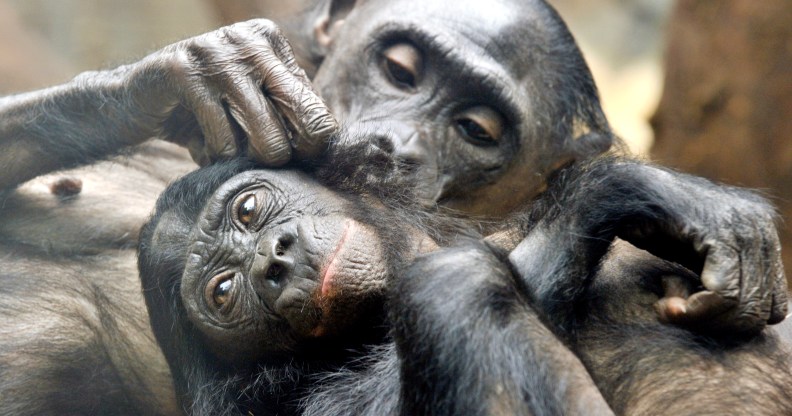New research seeks to explain why same-sex interactions between female pygmy chimps is so important

Two pygmy chimpanzees delouse eachother (BORIS ROESSLER/AFP/Getty Images)
Female pygmy chimps prefer to have sex with other females, rather than males, a study suggested earlier this week.
In the wild, adult female pygmies perform same-sex genital contacts, known as genito-genital rubbing, on a regular basis in their communities.
But scientists have been perplexed for decades as to why only female pygmy chimps perform same-sex sexual acts, as it’s rarely observed in males.
The study by the Max Planck Society found that females who engaged in same-sex acts often remained closer to each other than did mixed-sex pairs.
Moreover, scientists observed females had increased oxytocin levels after same-sex sexual interactions not observed following sex with males.
Male bonobos rarely, if ever, perform same-sex sexual interactions, while it is commonplace among females.
Some research previously suggested that this might be a way for females to bond, relieve stress and reduce social tension within the at time competitive chimp communities.
However, such theories never explained why same-sex behaviour was only ever observed exclusively among females, according to the study.
But by collecting behavioural and hormonal data for over a year from all adult members of a habituated bonobo community in the Democratic Republic of Congo, the researches found a potential answer.
Furthermore, the researchers collected urine to measure the hormone oxytocin, which is released in the body in other species after friendly social interactions, including sex and helps to promote cooperation.
Female pygmy chimps supported others more when in same-sex pairs.
After analysis, they found that females had measurable increases in urinary oxytocin following sex with females, but not following sex with males.

Two baby Bonobo chimps (DESIREY MINKOH/AFP/Getty Images)
Moreover, pygmy chimps who were in same-sex pairs who had more sex supported one another more often in conflicts. But the majority of such support was observed among females.
“It may be that a greater motivation for cooperation among females, mediated physiologically by oxytocin, is the key to understanding how females attain high dominance ranks in bonobo society”, explained co-lead author Martin Surbeck, a researcher at the Max Planck Institute for Evolutionary Anthropology and Harvard University.
“It is important to not equate human homosexuality with same-sex sexual behaviour in animals”, co-lead author Liza Moscovice, a researcher at the Leibniz Institute for Farm Animal Biology, cautioned.
“Our study suggests that in both humans and a close phylogenetic relative, the evolution of same-sex sexual behavior may have provided new pathways to promote high levels of cooperation.”
Pygmy chimps are known as ‘hippie apes’ due to having diverse sexual behaviour and communities not dominated by a particular sex, but instead being of balance.
Standing at around three feet-tall, they, alongside chimpanzees, are considered human’s closest evolutionary relative.
But rare and endangered, pygmy chimps, also called bonobos, are considered by some to be the most mentally advanced nonhuman animal.
They are only natively found in forests south of the Congo River, which have bene ravaged by deforestation and poaching.
As a result, pygmy chimps’ population – while not exactly known – has been on the decline for the last 30 years.
Scientists believe that the decline will continue for the next 45 to 55 years due to the pygmy chimps’ low reproductive rate and growing threats.

